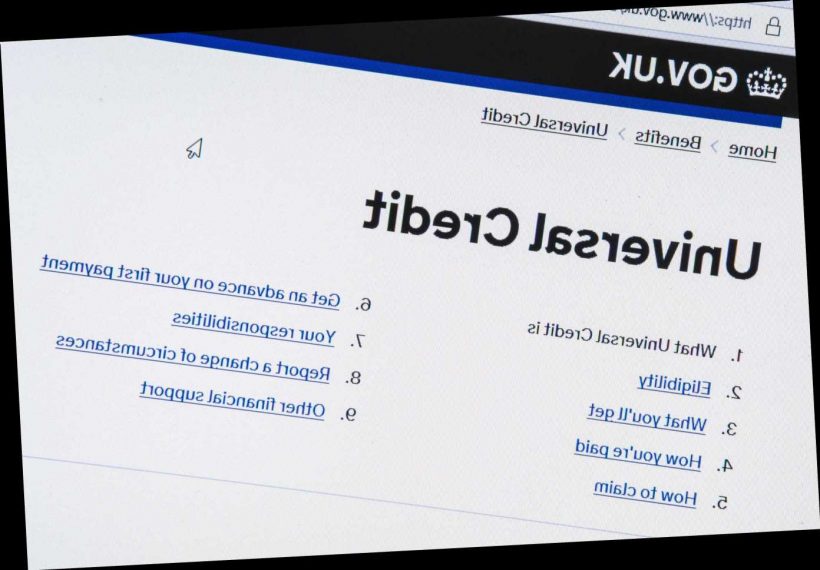UNIVERSAL Credit claimants will be given 24 months to repay advance loans from next month.
An advance payment is a loan that you can ask for to help you through the five-week wait for your first Universal Credit payment.
It's designed for people who need help to pay the bills or cover other costs while they wait.
Claimants who have taken out a loan are currently expected to pay it back within the first 12 months of getting it.
However, that time is set to double to 24 months from April 12, 2021.
The extension, which was previously set to come into effect in October 2021, was brought forward by Chancellor Rishi Sunak in last week's Budget.
How to apply for advance payment
AN advance payment is a loan that you can ask for to help you through the five week wait for your first Universal Credit payment.
You can apply for an advance payment in your online account or through your Jobcentre Plus work coach.
You're allowed to request the loan from the moment you first apply for Universal Credit until the date you get your first payment.
You'll need to explain why you think you need the advance, verify your identity (at your first Jobcentre Plus interview) and provide bank details for the advance.
If you can't open a bank account, speak to your work coach.
You'll usually be told the same day if you will get your advance loan.
If you need help, call the Universal Credit helpline on 0800 328 5644 (Textphone: 0800 328 1344).
Lines are open from 8am-6pm, Monday to Friday.
The change acknowledges that advance loans end up as debt, and that struggling claimants need longer to repay it.
The Sun has been calling for the five-week wait to be slashed to two weeks as part of our "Make Universal Credit Work" campaign.
From next month, the deduction rate will also be reduced to 25% of the standard allowance, down from 30%.
The Department for Work and Pensions (DWP) told The Sun the extended repayment period will only apply to new advance payments taken out from April.
It means claimants will get to keep £30 more of their monthly payments, according to DWP estimates.
Meanwhile, existing claimants will need to repay the loans within 12 months but they'll still benefit from the reduced deduction rate.
Will Quince, minister for welfare delivery, told The Sun the 24-month repayment option will give claimants "additional financial security at a time of economic uncertainty".
He added: "Additionally, over 350,000 families will keep more of their Universal Credit payment as a result of our decision to reduce the maximum deduction to 25%, with many families keeping up to £300 more per year."
An advance payment is an interest-free loan which means you will only pay back what you borrow, but remember you will be expected to pay it back.
Claimants can borrow up to 100% per cent of their estimated payment but you can also ask for less.
Once you've applied, the money is transferred to you within three working days and is supposed to last the full five weeks before your first payment.
The DWP then deducts an amount from your Universal Credit payment every month to repay it, starting with your first payout.
You can work out how much will be deducted from your payment every month by dividing the full cost of the loan by 24 from April.
You can ask for your repayments to be delayed for up to three months if you can't afford them, but this will only be allowed in exceptional circumstances.
What to do if you have problems claiming Universal Credit
IF you’re experiencing trouble applying for your Universal Credit, or the payments just don’t cover costs, here are your options:
- Apply for an advance – Claimants are able to get some cash within five days rather than waiting weeks for their first payment. But it's a loan which means the repayments will be automatically deducted from your future Universal Credit payout.
- Alternative Payment Arrangements – If you're falling behind on rent, you or your landlord may be able to apply for an APA which will get your payment sent directly to your landlord. You might also be able to change your payments to get them more frequently, or you can split the payments if you're part of a couple.
- Budgeting Advance – You may be able to get help from the Government for emergency household costs of up to £348 if you're single, £464 if you're part of a couple or £812 if you have children. These are only in cases like your cooker breaking down or for help getting a job. You'll have to repay the advance through your regular Universal Credit payments. You'll still have to repay the loan, even if you stop claiming for Universal Credit.
- Cut your Council Tax – You might be able to get a discount on your Council Tax by applying for a Council Tax Reduction. Alternatively, you might be entitled to Discretionary Housing Payments to help cover your rent.
- Foodbanks – If you're really hard up and struggling to buy food and toiletries, you can find your local foodbank who will provide you with help for free. You can find your nearest one on the Trussell Trust website.
We explain 11 ways to get extra cash or help if you're on Universal Credit.
The £20 a week Universal Credit uplift in payments is being extended for another six months, Mr Sunak revealed in the Budget.
However, it's since confirmed the boost will come to an end in October.
Source: Read Full Article

